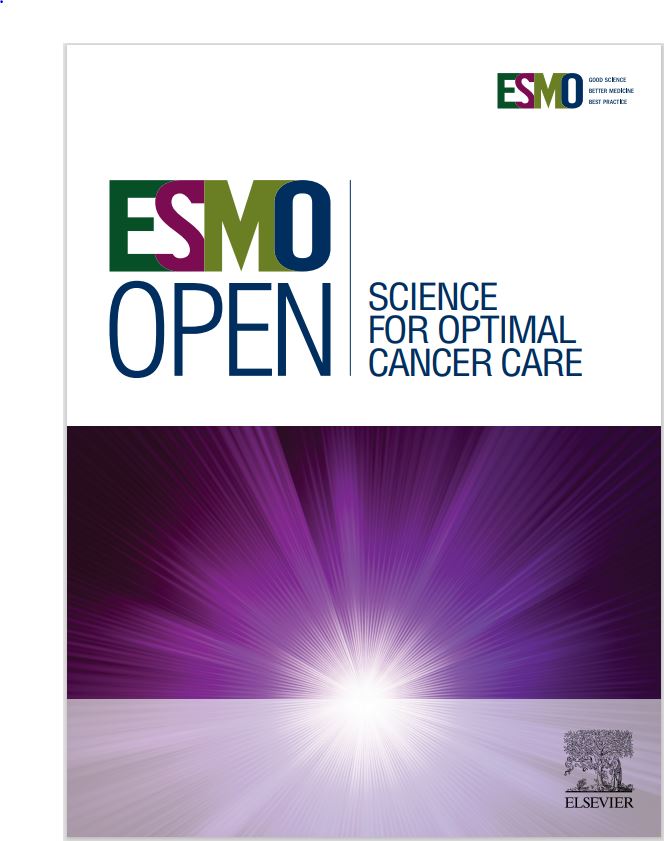Efficacy, safety, and pharmacokinetics of eribulin as monotherapy or in combination with irinotecan for patients with pediatric rhabdomyosarcoma, non-rhabdomyosarcoma soft tissue sarcoma, or Ewing sarcoma
IF 7.1
2区 医学
Q1 ONCOLOGY
引用次数: 0
Abstract
Background
In this report, we present results from studies of eribulin as monotherapy (Study 223) and in combination with irinotecan (the phase II part of Study 213) for patients with relapsed/refractory pediatric rhabdomyosarcoma (RMS), non-rhabdomyosarcoma soft tissue sarcoma (NRSTS), or Ewing sarcoma (EWS).
Patients and methods
Studies 223 and 213 were phase II multicenter trials that enrolled pediatric patients with histologically confirmed disease. Treatment comprised 21-day cycles of eribulin mesylate 1.4 mg/m2 on days 1 and 8 (Study 223) or eribulin 1.4 mg/m2 on days 1 and 8 plus irinotecan 40 mg/m2 on days 1-5 (Study 213). For both studies, the primary endpoints were objective response rate (ORR) and duration of response (DOR); secondary endpoint included safety.
Results
In Study 223, 21 patients (RMS, n = 8; NRSTS, n = 8; EWS, n = 5) were enrolled and treated. No responses were observed, resulting in early termination of enrollment. By the data cut-off date (22 February 2021), six patients (RMS, n = 3; NRSTS, n = 1; EWS, n = 2) had stable disease for ≥5 weeks. All patients had one or more treatment-emergent adverse event (TEAE), most commonly neutrophil count decreased (71.4%). In Study 213 (phase II part), 27 patients (RMS, n = 9; NRSTS, n = 9; EWS, n = 9) were enrolled/treated. By the data cut-off date (9 July 2021), three patients (one in each cohort) had had a response, resulting in an ORR of 11.1% and DORs of 2.9 (RMS), 1.4 (NRSTS), and 15.4 (EWS) months. All patients had one or more TEAE, most commonly diarrhea and neutrophil count decreased (51.9% each).
Conclusions
Eribulin, as monotherapy or combination therapy, exhibited a safety profile consistent with that observed previously in adult populations; however, efficacy in both studies was not considered adequate to advance investigation in these disease areas.
求助全文
约1分钟内获得全文
求助全文
来源期刊

ESMO Open
Medicine-Oncology
CiteScore
11.70
自引率
2.70%
发文量
255
审稿时长
10 weeks
期刊介绍:
ESMO Open is the online-only, open access journal of the European Society for Medical Oncology (ESMO). It is a peer-reviewed publication dedicated to sharing high-quality medical research and educational materials from various fields of oncology. The journal specifically focuses on showcasing innovative clinical and translational cancer research.
ESMO Open aims to publish a wide range of research articles covering all aspects of oncology, including experimental studies, translational research, diagnostic advancements, and therapeutic approaches. The content of the journal includes original research articles, insightful reviews, thought-provoking editorials, and correspondence. Moreover, the journal warmly welcomes the submission of phase I trials and meta-analyses. It also showcases reviews from significant ESMO conferences and meetings, as well as publishes important position statements on behalf of ESMO.
Overall, ESMO Open offers a platform for scientists, clinicians, and researchers in the field of oncology to share their valuable insights and contribute to advancing the understanding and treatment of cancer. The journal serves as a source of up-to-date information and fosters collaboration within the oncology community.
 求助内容:
求助内容: 应助结果提醒方式:
应助结果提醒方式:


